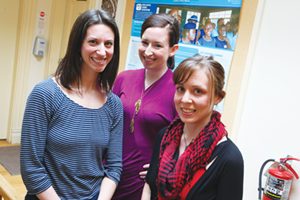 |
| Shali Manuel, Emily Murray and Liz Sharpe are talking to young cancer survivors for their research (Nick Pearce photo) |
Ten years ago, Shali Manuel was struggling to complete her undergraduate degree at Dalhousie. Something just wasn’t right. She was gaining weight. Her hair was falling out and she was exhausted.Â
“I was sent to every specialist for every symptom,” she says, now finishing a master’s degree in health promotion. When the diagnosis was finally made—thyroid cancer—it was almost a relief to put a name on it.
She had surgery followed by radioactive iodine treatment and, cancer-free, “felt like a whole new person.”
But it struck her, as she attended conferences and attempted to learn more about the disease, where were the other young people? People in their 20s, who like her, had to put their education or jobs on hold as they dealt with the disease?
According to a report released last year by the Canadian Cancer Society, more teenagers and young adults survive a cancer diagnosis but too little is known about this group.
Each year approximately 2,075 young people in Canada between 15 and 29 years of age are diagnosed with cancer and about 326 die from the disease. The five-year survival for this age group is 85 per cent, a five per cent increase from 1992-1995.
The chance to focus on this largely understudied group and their experience of cancer is what prompted Ms. Manuel to return to şÚÁĎłÔąĎÍřfor her master’s degree. In particular, her research looks at young women, who like her, have had thyroid cancer.
Along with lymphoma, thyroid cancer is the most common cancer for young women; the most common for young men are testicular cancer and lymphoma. Leukemia accounts for the greatest number of cancer deaths for both young men and women in this age group.
Two other master’s students, Liz Sharpe and Emily Murray, are also examining the experience of cancer in young people. Ms. Sharpe’s research takes a look at the cancer survivor’s return to school or the work world; Ms. Murray is researching the effects cancer has on young people’s sexuality.
|
“You’ve got cancer and all you want to be is normal,” adds Ms. Manuel, whose cancer came back two years after she thought she was in the clear.
That sense of normal takes years, perhaps decades, to recuperate. “One of the biggest things is losing that sense of invincibility and trust in your body,” she continues. “You’re always wondering, why did I get cancer? The women I talked to were feeling they lived healthy lifestyles and had good diets, and yet that wasn’t enough.”
In doing their research, the women confirm the findings of the Canadian Cancer Society report: young survivors face unique psychosocial issues as they think about future fertility finishing school or starting a career. They feel isolated and lack peer support. They also face the stress of navigating a cancer care system that is tailored to much older patients.
In addition to these challenges, teens and young adults face the possibility of future health problems, called late effects, as the result of either their cancer or the treatment they receive.
The women recommend support groups, retreats and targeted information suitable for survivors of this age group.
“They want to talk and connect with someone who knows what they’re going through,” says Ms. Murray. “They want someone who gets it.”
